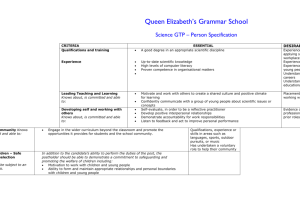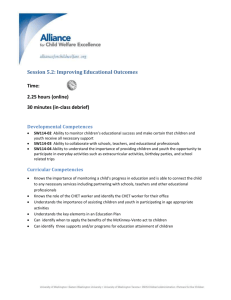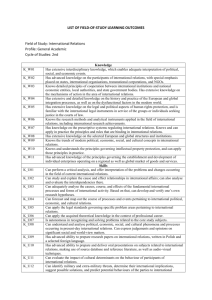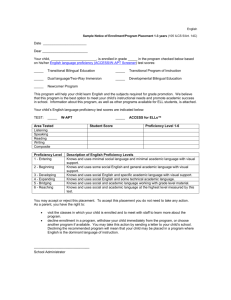5.3 Transition Planning with Adolescents Curriculum
advertisement
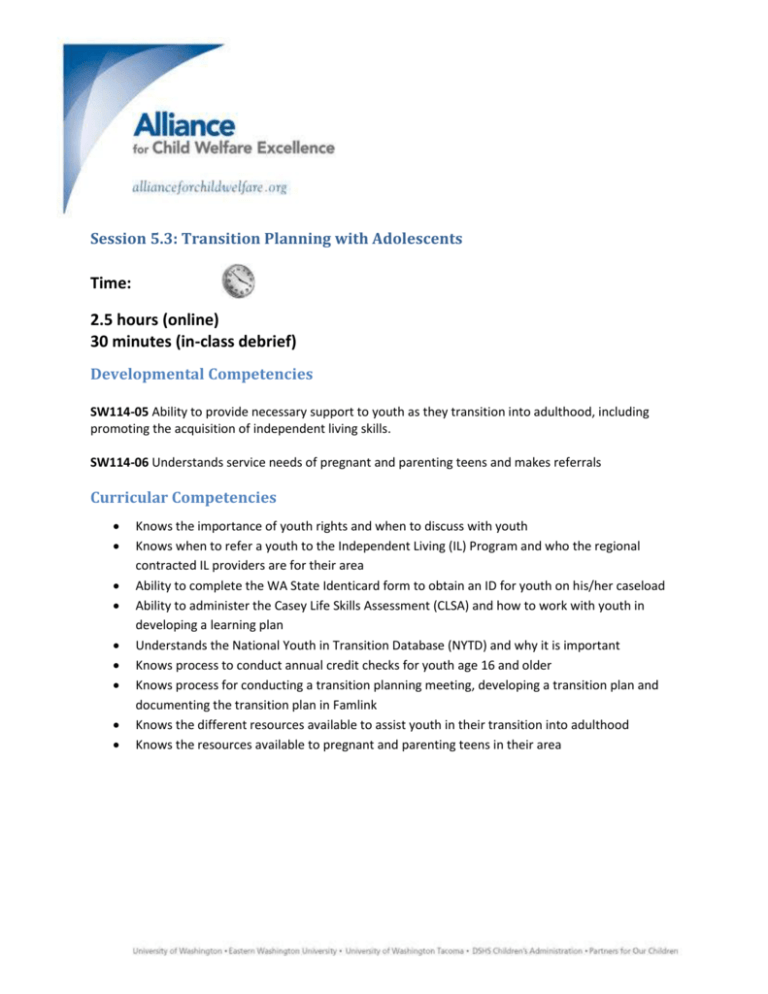
Session 5.3: Transition Planning with Adolescents Time: 2.5 hours (online) 30 minutes (in-class debrief) Developmental Competencies SW114-05 Ability to provide necessary support to youth as they transition into adulthood, including promoting the acquisition of independent living skills. SW114-06 Understands service needs of pregnant and parenting teens and makes referrals Curricular Competencies Knows the importance of youth rights and when to discuss with youth Knows when to refer a youth to the Independent Living (IL) Program and who the regional contracted IL providers are for their area Ability to complete the WA State Identicard form to obtain an ID for youth on his/her caseload Ability to administer the Casey Life Skills Assessment (CLSA) and how to work with youth in developing a learning plan Understands the National Youth in Transition Database (NYTD) and why it is important Knows process to conduct annual credit checks for youth age 16 and older Knows process for conducting a transition planning meeting, developing a transition plan and documenting the transition plan in Famlink Knows the different resources available to assist youth in their transition into adulthood Knows the resources available to pregnant and parenting teens in their area RCT Session 5.3: Transition Planning with Adolescents Talking about Competencies While adolescent policies are the same in every region, different areas of practice and different geographical locations may have different issues. For instance, there are a few remote areas of the state that does not have a contracted IL provider therefore the social worker would be responsible for completing the above tasks rather than referring to a contracted provider. Be sure to talk with your students about knowing the resources in their area and who is responsible for doing the different tasks. Materials and Preparation All materials for this session are in Canvas. Refer to the workflow below to see how they are used. Transition Planning Field Activity Transition Planning and Working with Adolescents Competency Worksheet E-Learning Presentation Resources All of these resources are available to students in Canvas. CA Operations Manual : Adolescent policies 4310 Request for Washington State Identicard (DSHS 11-077) Request for Identicard Waiver Fee (DSHS 16-029) Transition Plan – (DSHS 14-417) Transition Plan - Frequently Asked Questions www.independence.wa.gov www.caseylifeskills.org Page 2 of 5 RCT Session 5.3: Transition Planning with Adolescents Session Flow At the start of this session, students are directed to a worksheet in which they reflect on the competencies. Step Delivery Method Time 1 2 5.3 Field Assignment Worksheet Part 1: Awareness Canvas Canvas 45 minutes 15 minutes 3 Online presentation E-learning, link provided in Canvas 60 minutes 4 Worksheet Part 2: Competency Exercise Canvas 30 minutes 5 Discussion and debrief In class or over the phone 30 minutes Session Coach’s Notes Worksheet Activity The worksheet activity at the beginning of this session is designed to focus students on the competencies. Review it, and be prepared to discuss it with students after they complete it. Session 5.3: Transition Planning Worksheet Part 1: Awareness Why is life skill development important for a youth in care? What resources are you aware of to assist youth? Why do youth need a safe and viable transition plan? Why do you think it’s important to have it documented? Page 3 of 5 RCT Session 5.3: Transition Planning with Adolescents Part 2: Competency Exercise The following questions are based on the curricular competencies for this session. Read through all questions before writing your answers. 1. (Knows the importance of youth rights and when to discuss with youth) At what age do you provide the youth with a copy of their youth rights? What website is the youth rights manual located? What additional rights are provided to youth 12 and over? 2. (Knows when to refer a youth to the Independent Living (IL) Program and who the regional contracted IL providers are) At what age do you refer a youth to the contracted Independent Living program? Who is the contracted IL provider for your area? Describe the different services a youth may receive? 3. (Ability to complete the WA State Identicard form to obtain an ID for youth on his/her caseload) What form(s) do you use to request a WA State Identicard for a youth? What are the three ways you can submit the WA State Identicard form? Why is having an Identicard important? 4. (Ability to administer the Casey Life Skills Assessment and how to work with youth in developing a learning plan) What is the website for the Casey Life Skills Assessment? How often do you complete the assessment for youth on your caseload? What contracted program can assist you in this task? Describe the CLSA? 5. (Understands NYTD and why it is important) As a social worker what do you need to do to meet the NYTD requirements? 6. (Knows process to conduct annual credit checks for youth age 16 and older) At what age do you begin requesting an annual credit check for youth on your caseload? What are the three credit reporting agencies you have to use? What is the process for requesting a credit check? Why is it important for youth to have good credit? 7. (Knows process for conducting a transition planning meeting and documenting the transition plan in Famlink) Write the list of steps to prepare for a transition plan. How often does the transition plan be reviewed and/or updated? What areas should be addressed in a transition Plan? Page 4 of 5 RCT Session 5.3: Transition Planning with Adolescents 8. (Knows the different resources available to assist youth in their transition into adulthood) Identify 5 of the different programs or resources available to assist youth in their transition into adulthood? 9. (Knows the resources available to pregnant and parenting teens in their area) What website hosts information and resources for pregnant and parenting teens? Self-Paced Presentation The self-paced presentation is a PowerPoint presentation that students access by clicking a hyperlink. The presentation includes automatically scored multiple choice questions. The PowerPoint and the questions are available in myAlliance. Discussion and Debrief Plan for a debrief discussion to review the Worksheet, either in a group or with individual students. When answering questions for students, use the Resources listed in the Resources section of this document. Page 5 of 5

